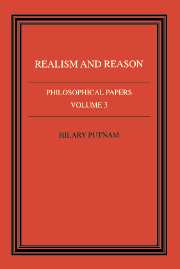Book contents
- Frontmatter
- Contents
- Dedication
- Introduction
- 1 Models and reality
- 2 Equivalence
- 3 Possibility and necessity
- 4 Reference and truth
- 5 ‘Two dogmas’ revisited
- 6 There is at least one a priori truth
- 7 Analyticity and apriority: beyond Wittgenstein and Quine
- 8 Computational psychology and interpretation theory
- 9 Reflections on Goodman's Ways of Worldmaking
- 10 Convention: a theme in philosophy
- 11 Philosophers and human understanding
- 12 Why there isn't a ready-made world
- 13 Why reason can't be naturalized
- 14 Quantum mechanics and the observer
- 15 Vagueness and alternative logic
- 16 Beyond historicism
- Bibliography
- Acknowledgements
- Index
6 - There is at least one a priori truth
Published online by Cambridge University Press: 06 January 2010
- Frontmatter
- Contents
- Dedication
- Introduction
- 1 Models and reality
- 2 Equivalence
- 3 Possibility and necessity
- 4 Reference and truth
- 5 ‘Two dogmas’ revisited
- 6 There is at least one a priori truth
- 7 Analyticity and apriority: beyond Wittgenstein and Quine
- 8 Computational psychology and interpretation theory
- 9 Reflections on Goodman's Ways of Worldmaking
- 10 Convention: a theme in philosophy
- 11 Philosophers and human understanding
- 12 Why there isn't a ready-made world
- 13 Why reason can't be naturalized
- 14 Quantum mechanics and the observer
- 15 Vagueness and alternative logic
- 16 Beyond historicism
- Bibliography
- Acknowledgements
- Index
Summary
In a number of famous publications (the most famous being the celebrated article ‘Two dogmas of empiricism’) Quine has advanced the thesis that there is no such thing as an (absolutely) a priori truth. (Usually he speaks of ‘analyticity’ rather than apriority; but his discussion clearly includes both notions, and in his famous paper ‘Carnap and logical truth’ he has explicitly said that what he is rejecting is the idea that any statement is completely a priori. For a discussion of the different threads in Quine's arguments, see chapter 5). Apriority is identified by Quine with unrevisability. But there are at least two possible interpretations of unrevisability: (1) a behavioral interpretation, namely, an unrevisable statement is one we would never give up (as a sheer behavioral fact about us); and (2) an epistemic interpretation, namely, an unrevisable statement is one we would never be rational to give up (perhaps even a statement that it would never be rational to even think of giving up). On the first interpretation, the claim that we might revise even the laws of logic becomes merely the claim that certain phenomena might cause us to give up our belief in some of the laws of logic; there would be no claim being made that doing so would be rational. Rather the notion of rationality itself would have gone by the board.
I don't know if Quine actually intended to take so radical a position as this, but, in any case, I think that most of his followers understood him to be advocating a more moderate doctrine.
- Type
- Chapter
- Information
- Philosophical Papers , pp. 98 - 114Publisher: Cambridge University PressPrint publication year: 1983
- 7
- Cited by



